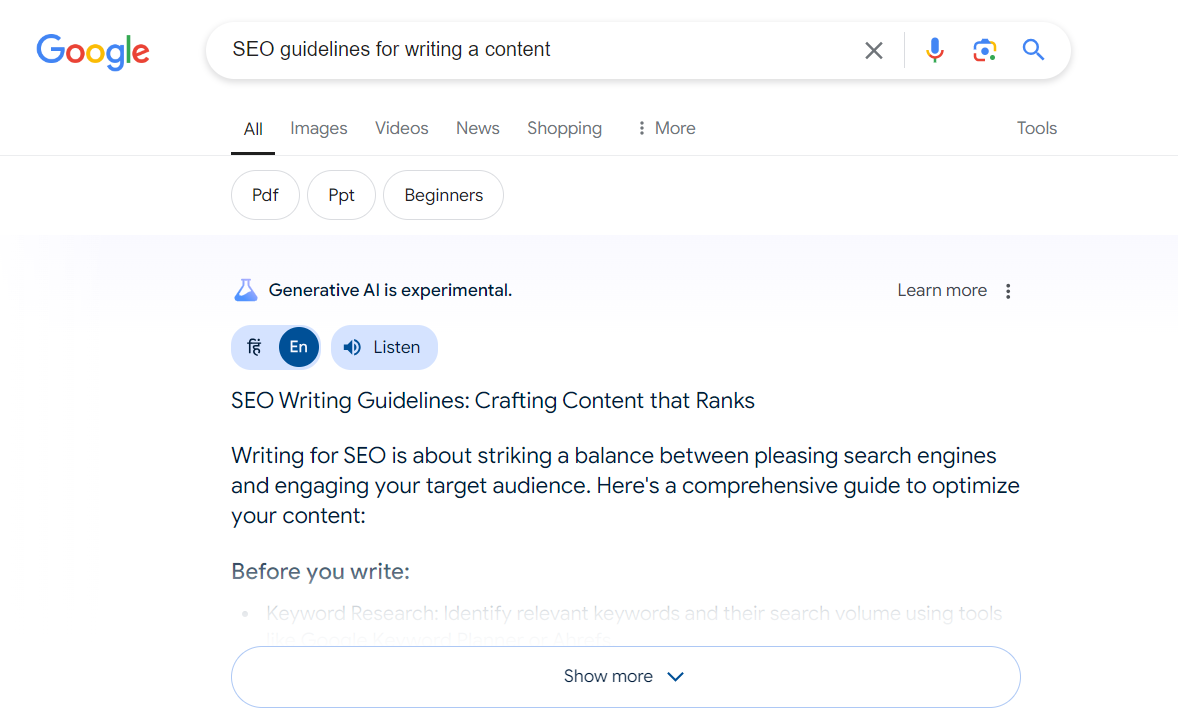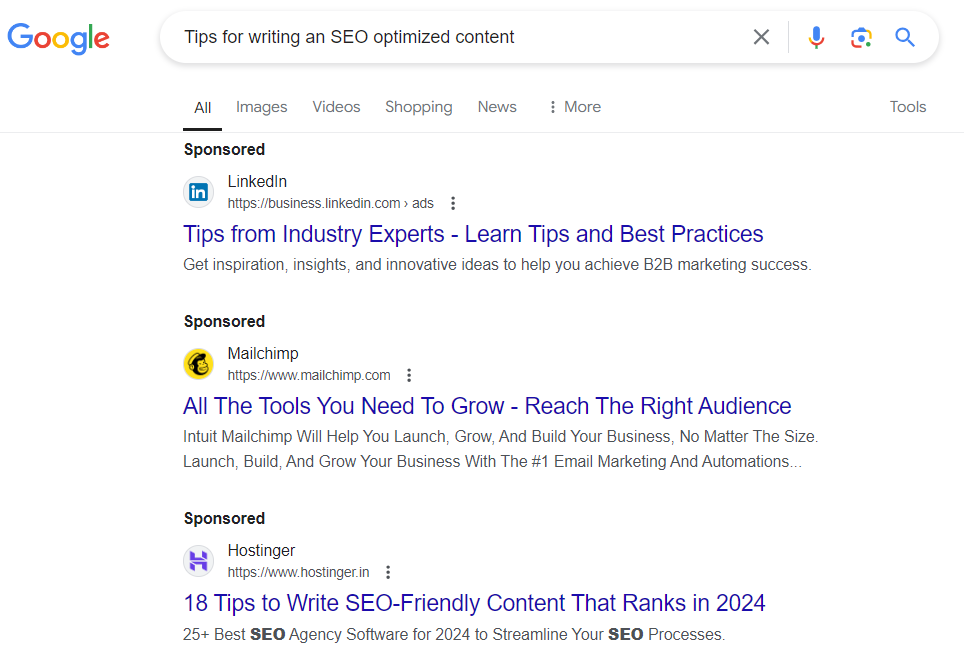
Ever wondered why some Google AI powered search results feel like they know exactly what you’re looking for? That’s the magic of AI-generated content in action. These results, powered by Google’s sophisticated algorithms, aim to provide users with more tailored and personalized information right on the search engine results page (SERP).
An example of Google AI powered search results is evident in this image itself.

When a user searches for “SEO guidelines for writing content” Google’s AI algorithm does not simply provide a list of web pages. Instead, it generates a concise summary of SEO writing guidelines, pulling information from various sources and presenting it in a clear, easy-to-read format at the top of the search results page. This allows users to quickly grasp essential information without having to click through multiple websites.
This is really exciting, isn’t it? AI changing the search game is a big deal! But what about the folks who write SEO content for businesses? Are their jobs on the line?
So, who are these SEO writers?
They are the unsung heroes behind much of the web content we consume daily. But what exactly do they do? In simple terms, SEO content writers create content that is not only engaging and informative but also optimized for search engines. This optimization helps businesses rank higher on search engine results pages (SERPs), making it easier for potential customers to find them.
Optimization in the context of SEO (Search Engine Optimization) refers to the process of fine-tuning various elements of a website or piece of content to improve its visibility and ranking on search engine results pages (SERPs). The ultimate goal of optimization is to make it easier for search engines like Google to understand the content’s relevance to specific search queries, thus increasing its chances of appearing higher in search results.
Social Media Management for Doctors: Attracting more patients
Learn how social media management for doctors can be your secret weapon for attracting new patients and growing your medical practice.

Why Does Google Want Optimized Content?
Google’s mission is to organize the world’s information and make it universally accessible and useful. To achieve this, Google wants to ensure that the content it presents in search results is highly relevant, authoritative, and valuable to users. Optimized content helps Google achieve this goal by providing clear signals about the content’s topic, relevance, and quality. This, in turn, enhances the overall search experience for users, making it more likely that they’ll find what they’re looking for quickly and easily.
How Does Google Rank Content?
Google uses sophisticated algorithms to analyze and rank billions of web pages based on their relevance and quality. While the exact algorithms are closely guarded secrets, Google has revealed some key factors that influence rankings:
- Relevance: Google assesses how closely a piece of content matches a user’s search query, taking into account factors like keywords, topic relevance, and context.
- Quality: Google prioritizes content that is well-written, authoritative, and trustworthy, considering factors such as grammar, spelling, factual accuracy, and the expertise of the author.
- User Experience: Google evaluates factors related to the user experience, such as page loading speed, mobile-friendliness, and overall website usability.
- Backlinks: Google considers the quantity and quality of backlinks pointing to a piece of content, as backlinks from reputable websites signal to Google that the content is valuable and authoritative.
- Engagement Metrics: Google analyzes how users interact with content, including metrics like click-through rate (CTR), dwell time, and bounce rate, as content that engages users and keeps them on the page is likely to rank higher.
By optimizing content according to these factors, SEO content writers can improve its chances of ranking higher on Google’s SERPs, ultimately driving more organic traffic to businesses’ websites.
So, what is the Impact of Google AI powered search results on SEO Content?
With the emergence of AI-generated results on search engine results pages (SERPs), there’s a noticeable shift in the landscape of online visibility. These AI-generated results, often presented in featured snippets or knowledge panels, provide users with quick, concise answers to their queries directly on the search results page. While this enhances user experience by delivering relevant information efficiently, it also poses challenges for SEO content writers:
Reduced Visibility for Organic Results:
AI-generated results occupy prime real estate at the top of SERPs, pushing down organic search results. This means that SEO-optimized content, which traditionally relied on ranking high in organic search results to drive traffic, may receive less visibility and click-throughs
Limited Opportunities for Clicks:
Users may find the information they need from AI-generated results without clicking through to individual websites. As a result, SEO content writers may experience a decrease in organic traffic and engagement on their websites
Increased Competition for Featured Snippets
SEO writers now face heightened competition to capture featured snippets, as these prominent positions are often occupied by AI-generated content. Crafting content that is not only optimized for search engines but also structured to compete for featured snippets becomes essential for maintaining visibility and relevance
So, are Google AI Powered Search Results the end of the road for SEO content writers?
While the emergence of AI-generated content may seem like a roadblock for SEO content writers, there’s still light at the end of the tunnel. It’s crucial to remember that Google’s priority is always relevance and user experience. If Google AI Powered Search enhances these aspects, it will prioritize it. However, SEO writers have the opportunity to adapt and focus on providing unique value and authenticity, which are factors AI may struggle to replicate. Ultimately, it’s about aligning with Google’s goals while leveraging human creativity and expertise to stand out in a crowded digital landscape.
In certain cases, AI-generated content may not be the most relevant or helpful option for users. Take, for example, the query “how to tie a tie.” When conducting this search, the top result on Google’s search engine results page (SERP) isn’t an AI-generated snippet. Instead, it’s a YouTube video titled “How to tie a tie – VERY simple and easy tie knot for beginners.”

The video thumbnail features a person demonstrating how to tie a tie, offering a visual guide for users seeking practical instruction. With a runtime of 3 minutes and 37 seconds, the video provides comprehensive guidance, supported by a brief text description that emphasizes its simplicity: “Super-easy method. Tied in 1 minute! Just copy in the mirror!”
What’s noteworthy is that the description also includes a transcription of the audio from the video, making the content accessible to users with hearing impairments or those who prefer reading over watching. This combination of visual demonstration and textual explanation caters to diverse learning preferences, enhancing the overall user experience.
Instances like these, where practical demonstrations and visual aids are paramount, AI-generated content may not offer the same level of relevance or effectiveness. Google’s commitment to championing relevance and user experience means that it will prioritize content formats that best serve users’ needs, whether that’s through Google AI powered search snippets or multimedia resources like YouTube videos.
Relevancy of Google Ads
In another scenario, consider the Google search engine results page (SERP) for the query “Tips for writing SEO-optimized content.” Here, the top three results aren’t organic listings but sponsored ads. These companies have paid Google to ensure their links appear prominently at the top of the page.

While it might seem that paid ads could overshadow organic content, it’s essential to recognize Google’s commitment to relevance and user experience across all search results. Even in Google Ads, where businesses pay for visibility, ranking isn’t solely determined by financial investment. Instead, Google factors in the quality and relevance of the content when determining ad rankings.
Looking ahead, promoted SEO-optimized content may still effectively compete with Google AI powered search results. The key lies in maintaining a focus on providing valuable, high-quality content that meets users’ needs and aligns with Google’s standards for relevance and user experience.
